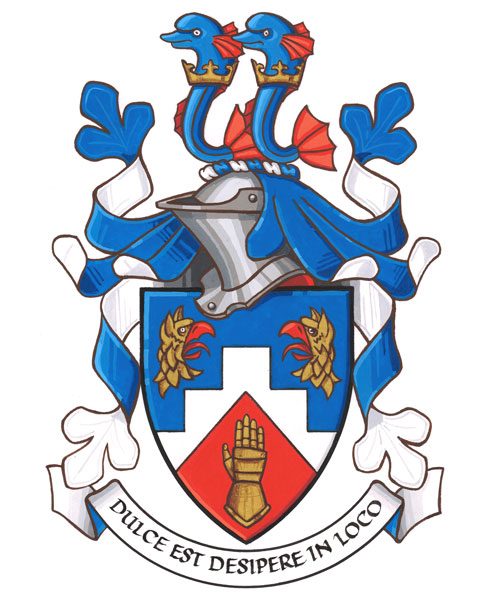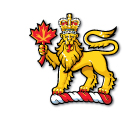- The Governor General of Canada

The contents of this Register are intended for research purposes only. The heraldic emblems found in the Register may not be reproduced in any form or in any media without the written consent of the Canadian Heraldic Authority and/or the recipient.
James Carman Mainprize
Niagara-on-the-Lake, Ontario
Grant of Arms, Flag and Badge, with differences to George Julian Fersen Banffy Gosling Mainprize, Victoria Alberta Christine Banffy Gosling Mainprize, Clara Victoria Mainprize and Gabriel William Carman Mainprize
May 15, 2017
Vol. VI, p. 725

[ previous page ]
Blazon
Arms
Per chevron Azure and Gules, a chevron its upper edge grady Argent between in chief two griffin heads respectant Or beaked Gules and in base a hand in armour Or;
Crest
Two dolphins hauriant Azure finned Gules each gorged of a coronet flory Or;
Motto
DULCE EST DESIPERE IN LOCO;
Symbolism
Arms
The white steps represent the shape of the Sharon Temple in Sharon, Ontario, the place of worship of the Children of Peace, one of whom was Mr. Mainprize’s ancestor William Mainprize, who came to Canada from Yorkshire in 1830. The triangular space represents the red buildings at Lunenburg harbour, Nova Scotia, an allusion to Mr. Mainprize’s ancestor Johann Christian Ernst, who came to Halifax from Saxony in 1750 and settled in Lunenburg shortly thereafter. The griffin heads serve as a reference to Mr. Mainprize’s wife Virginia, whose Hungarian ancestors named Banffy had griffins in their coats of arms, and whose birthplace of Budapest has a griffin as a supporter to its arms. The gauntlet refers to the name Mainprize, from mainprise, an archaic French word composed of main (“hand”) and prise (“taken”).
Crest
The dolphins refer to the maritime occupations of the Mainprize and Ernst ancestors, who respectively were master mariners and lighthouse keepers in England, and dock builders and owners in Lunenburg. The coronets allude to the fleurs-de-lis of the crest used by the Gosling family of Virginia Mainprize.
Motto
This Latin phrase, meaning “It is delightful to be foolish at the right moment”, is taken from the 4th book of the Odes of Horace (XII.28) and indicates Mr. Mainprize’s belief in the importance of taking a fanciful and good-humoured approach to life.
